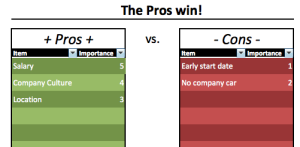Around nine months ago, I made a successful career change.
Back then, before the switch, my average work day looked much different. I used to be an outside sales rep for the number one commercial printing company in the United States.
I would make calls to marketing directors, try to schedule in-person meetings, and pitch my company’s value-added services and products.
And during this role I still got my entrepreneurial work done: I would write for this blog and my books in the early hours before work or late at night after work.
Except all day at my sales job I would think about my online business, which one day I took as a sign that I had to 100% pursue it.
Though I enjoyed my day job, I constantly felt a pull to not settle for something good. I knew I had to give all my energy to doing what I love. So I left the sales job and became a full-time entrepreneur and author.
What was the result? Greatest decision of my life.
I fortunately had income from my business and books coming in, plus I saved a bunch of money while at the sales job to make a smooth transition.
Though just because it worked for me, realize that all career changes aren’t the same.
There’s a difference between making a career change in a controlled, strategic manner where you know what job you want and you have landed it. That’s the goal.
Or the career change that is a tailspin out of the former job onto the couch for six months with no direction or clarity. You don’t want anything to do with that. It will cause you more emotional and financial pain than you asked for.
However, you don’t have to worry about bumming it on the couch if you just follow the six steps below (three pre-steps and three-transition steps) to navigate a successful career change:
Pre-Work
Understand Why You’re Leaving
Around 70% of Americans are not happy at work, yet I bet the vast majority does not clearly understand why. And because they don’t know why, they don’t know what job to look for. Or they take a shot in the dark at another career and find themselves still feeling unhappy.
Top performers know the why behind everything they do. They get super clear on why they want to move on from their current position. They understand why a different career would be a better fit for them. And they make the decision that the upside in changing jobs outweighs the downside.
(Or, in some cases, identifying the why will lead you to do things differently in your current job so you don’t have to leave.)
For example, a criminal lawyer may discover he’d be much happier getting his hands dirty as an investigator rather than in the courtroom, so he wants to go back to get his criminal justice degree online.
Even in my author coaching, I tell aspiring authors to start with knowing why they want to write a book. Because having a why will carry you when faced with roadblocks and thoughts of not moving forward.
Know What You Want
Based on the why exercise, it’s time to get specific and focus on what you want to do instead of your current job.
Give yourself the freedom to think of any and every possibility. Don’t worry about how you’re going to get this position, we’ll address that later. Just brainstorm what you want to do more than anything else.
To push you in the right direction, consider questions like: How does the job align with my passion or curiosity? What is the job description? What is the company culture like? Would I be happy doing it regardless of income? What is the job title?
You’ll know you’ve completed this step when you know the specific job title you’re aiming for.
Create A Strategy
With the why and what in place, it’s time to create a strategy to land your new job. Depending on your unique situation, this could mean making a to-do list to:
- Find 10 companies that offer this position
- Take classes to get a license
- Go back to school to get a different degree (I don’t recommend this for most cases)
- Sharpen up your resume and cover letter
- Practice interviewing
You also need a strategy for things outside the new job search during the transition period. Have answers to: Can you afford rent if you have a month off from receiving paychecks? Are you able to terminate your lease if your career takes you to a new city? Is your significant other or family in support of the change?
A career change is a prime example of why having $1,000 in an emergency fund goes a long way. This will help you keep your head above water if your finances are stretched during the job transition. (For more money makeover tips, order my book Freedom Mindset.)
If you commit to stick at your current job until you accept the new position, then you don’t need to plan as much for the lifestyle transition in between. Though everyone needs to create a strategy for how they’re going to attack getting the job they want.
Transition Work
Reposition Yourself
You’ve mapped out what to do, now it’s time to start executing.
To get this new job you want, you need to show them why you’re the perfect fit for it. But right now all your information is positioned for your old job.
So before you start applying, spend time updating your personal marketing information (resume, cover letter, LinkedIn, etc.). Get out with the old personal brand and rebrand yourself for this new job.
Tweak your resume to point to the new job description as much as possible (in a truthful manner). Show how your unique skills make you an excellent fit. And come up with good interview answers before the interview.
You have to make it crystal clear your resume and cover letter are catered to a specific job or you’re not going to get the job. If you are aiming to get hired on one of the top tech companies in San Francisco, list down the name of the companies and research about their culture, as well as the roles and responsibilities of their job vacancies. You may revise your resume fit for the job you are applying for.
Network Like Crazy
If you’re a regular reader of mine, you know I often say “network like crazy.” This phrase was even a chapter title in The Golden Resume. And that’s because I believe networking is so underutilized in job searches.
People have unbelievable connections that will put their name at the top of the hiring list, yet they either don’t realize it or don’t get this advantage because they don’t make an effort to ask.
All you need is one helpful connection who knows someone (or is the someone) that can get you your ideal job. Calling old friends and connections takes time, yet it has more potential to shorten a job search than anything else. So get the word out that you’re looking for a new job.
Keep Hustling
Read about your new career. Take people out to coffee who are professionals in the career you want to transition to. Get a mentor. Do all that you can to develop knowledge, skills, and connections that will vouch for you during the hiring process.
Getting a great job in a career change isn’t easy. It takes time and patience. Sometimes you need to take your time to get the skills or qualifications for the job. Sometimes there isn’t a job opening for the position you want and you just need to wait. However, I promise you that if you keep hustling, you’ll eventually be in position to get the job when others give up.
Final Words
Humans don’t enjoy change. They get so comfortable in their routine, that even a tiny change—like taking a different route to work—will throw them off.
So when you consider the massive change that is a career transition, you will probably feel super stressed as your brain tries to process it all. That’s ok. That’s normal.
The good news is that a career change is temporary. And assuming you did your pre-work to know why you’re getting out and into a new career, be excited you’re making the best move for your future.
You’ll be far happier on the other side and more confident knowing that your ship didn’t wreck during the job transition. You got this.
Oh, I almost forgot, enjoy your new career!
(And when you get a new job offer, be sure to negotiate a higher salary to make $1,000 to $10,000 more.)



